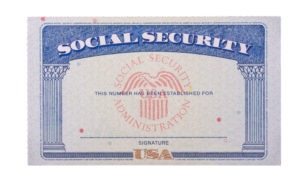
Getting paid under the table can jeopardize your ability to draw disability benefits. Specifically, you may not qualify for Social Security Disability Insurance (SSDI) benefits. SSDI is a program that bridges the gap between the time you suffer a disabling impairment and the time you reach full retirement age.
To qualify for SSDI, you need to meet certain work history requirements based on your age. You cannot qualify unless you pay taxes on your income.
Was I Paid “Under the Table?”
Receiving payment under the table means your employer is not reporting the money they pay you to the Internal Revenue Service (IRS). They are likely paying you in cash and are not taking taxes out of your check. These employers may not ask you to complete required tax forms, such as a W-4 or I-9.
Some jobs are much more likely to pay under the table than others, but it can occur in almost any industry. Manual labor, childcare, handyman jobs, and housekeeping jobs are often paid in cash without reporting to the IRS.
Some jobs also pay part of your income under the table, which occurs frequently when a large portion of your income comes from tips.
40+ years of experience from strong, knowledgeable, compassionate attorneys.
Start A Free EvaluationWhy Does Under-the-Table Pay Disqualify Me for SSDI Benefits?
The Social Security Administration (SSA) requires you earn a certain number of work credits to be eligible for SSDI benefits. You earn these credits by paying Social Security payroll taxes (also known as FICA) on the income you earn. If your employer pays you legally and takes out payroll taxes, you will likely earn up to four work credits each year.
Generally, you need a minimum of 20 credits—or about five years of work—to qualify for the SSDI program. If you have fewer credits, you may still be eligible.
If your employer pays you fully or partly under the table, however, you may not pay enough taxes to earn the required number of work credits. This is why it is important to report all your income to the IRS and pay these taxes.
We know you’re hurting. We can help. Free case evaluations, home and hospital visits.
Contact Us Now For HelpCan I Qualify for SSDI in Spite of My Under-the-Table Work History?
In some cases, employees who receive their pay under the table claim it as self-employment or miscellaneous income on their tax returns. In this case, they pay Social Security taxes on their income and earn work credits toward SSDI and Social Security retirement benefits.
If you have been reporting cash payments or cash tips on your taxes and paying FICA taxes, you are most likely earning work credits and may be eligible.
You need an attorney with the experience and dedication to give your case the care it deserves.
Start A Free EvaluationCan I Work Under the Table While Drawing SSDI?
Some people may try to work under the table while also drawing SSDI benefits. This is not a good idea, as it could constitute fraud if discovered. If you can work and need the additional income, you should consider getting a job that pays legally.
You may be able to return to work after receiving approval for benefits. If you follow guidelines from the Social Security Administration and report a change in your work status, you can continue to earn some income without worrying about serious consequences.
If the SSA discovers you are working under the table while drawing benefits, you may have to pay back the benefits you earned during the months you worked, in addition to penalties. You could also lose the ability to draw disability benefits in the future, depending on the situation. You could also be charged and convicted of a crime, per the U.S. Department of Justice.
We can address all the legal hurdles that may be keeping you from getting a fair settlement.
Speak To An Attorney TodayHow Can I Learn More About My SSDI Eligibility?
If you cannot work due to an impairment and need help making ends meet, disability benefits can help. However, if you did not work regularly or think you earned only a small amount, you may be unsure of your SSDI eligibility.
Our attorneys can help you understand your eligibility and help you apply for any programs for which you qualify. We can explain more about:
- The SSA’s Blue Book, which details qualifying impairments
- How a workers’ age affects work credit requirements
- The disability benefits application process
- Documents you need to demonstrate your disability
What Is Entailed in an Application for Disability Benefits?
When you apply for disability benefits, you should be prepared to provide documentation that proves your inability to work. You can show evidence of your disability through your medical records and statements from your doctors.
Then, you can apply with the help of a disability benefits attorney from our team. We can ensure that you have all the necessary paperwork and assist you with filing.
It can take up to 3-5 months to hear back from the SSA. You may receive news that:
- Your claim was denied
- Your claim was approved
- The SSA requires additional documentation
It is common to receive a denial initially. However, don’t let this discourage you, should you receive a denial. You can appeal your denial, starting with a reconsideration. If necessary, we will represent you at a hearing before an Administrative Law Judge.
How Can a Disability Benefits Attorney Help Me With My Case?
Whether you are just beginning to think about applying for benefits or you have already sent in your application and are awaiting a decision, we can help. Our disability benefits attorneys have more than 40 years of experience helping people seek the benefits they need.
Our lawyers can:
- Tell you how your under-the-table pay could affect your application
- Explain if you meet work credit requirements
- File your application
- Make sure you have all the necessary paperwork
- Explain how to gather additional documentation
- Help you understand why a claim was denied
- Represent you during the appeal process
We can guide you through the entire benefits process. You don’t have to figure out your disability benefits application on your own.
Contact Our Team at Berger and Green to Learn Your Next Steps Today
Our team can tell you if you qualify for disability benefits, even if you were paid under the table, earn income through gig labor, or other alternative work arrangements. Your consultation is free and comes with no obligation.
Call our office today at (412) 661-1400 for your free consultation.










